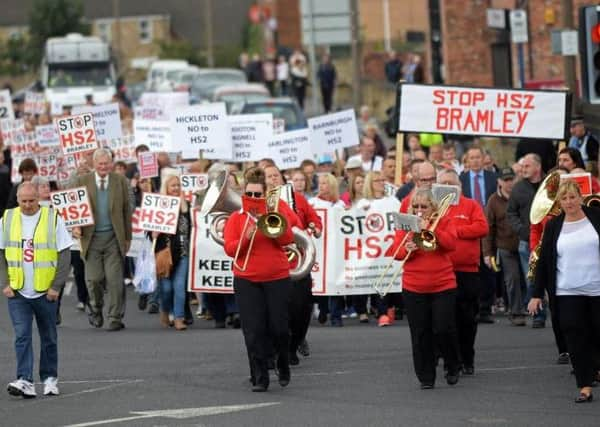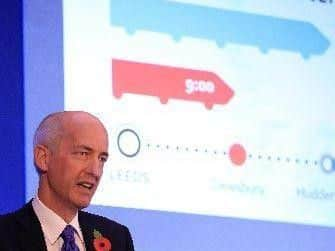Changing tracks on HS2: How David Higgins hopes economic case will change opposition in Yorkshire


From violent brawls and protest marches to bitter political battles, there have been few issues that have caused more controversy in Yorkshire over the past few years than HS2. But Sir David Higgins, chairman of High Speed Two Ltd, hopes a major new report developed over 12 months to highlight its economic argument will start to change the public conversation about the often-derided scheme.
Advertisement
Hide AdAdvertisement
Hide Ad“Hopefully, it puts to bed the argument of ‘Why do we need HS2, why can’t we patch up the existing Victorian railway network?’,” Higgins tells The Yorkshire Post.


Following workshop discussions with around 100 businesses, universities and local councils, HS2 officials have produced a report called Getting the best out of Britain which suggests the £56bn scheme is the key to bridging the gap between London and the rest of the country, both physically and economically. In Yorkshire, the report claims, HS2 presents a golden opportunity to tackle the region’s lagging productivity levels, which are the second lowest in the whole of England and in the Leeds City Region alone are estimated to be costing the local economy around £14bn.
The in-depth report sets out the region’s problems clearly; 55 per cent of businesses in Yorkshire and the Humber are dissatisfied or very dissatisfied with the region’s transport infrastructure, including the congestion that clogs up the M1 and M62 and the overcrowded, slow-running and infrequent trains that mean a 40-mile journey between two major cities in Sheffield and Bradford takes a minimum of one hour and 16 minutes.
That has contributed to a situation where productivity levels have fallen in Yorkshire since 1997 to far below the national average; a matter of considerable concern given that workers in France, Germany and the US produce around as much in four days as the average British worker does in five.
Advertisement
Hide AdAdvertisement
Hide AdBut the study also highlights the region’s incredible capabilities and potential – from advanced manufacturing in Sheffield, to Leeds’s thriving digital sector and York’s world-class expertise in biotechnology.


Higgins says: “The excuse that is often given about the productivity gap between the North and the South is the North doesn’t have the right level of skills and expertise. This report says that is not true and that is not what is holding the region back and causing the productivity gap.”
The report, perhaps unsurprisingly for one commissioned by HS2 themselves, suggests high-speed rail will be a key part of the solution to the problem.
“The smaller scale of urban areas makes it difficult for city regions in the North of England to secure the same degree of scale and success as their counterparts in the South East. In the North, the population is spread out across a number of cities and the density of employment in urban areas is lower than in the rest of England.
Advertisement
Hide AdAdvertisement
Hide Ad“This is compounded by poorer levels of transport connectivity compared to the South East. HS2 offers faster, more frequent and more reliable travel between cities and areas of the UK and will increase capacity on our congested railways.
“The eastern leg of Phase Two of HS2 will connect Yorkshire to the West and East Midlands and Transport for the North is exploring options to make use of the HS2 line for faster services between Leeds, York and Newcastle, improving links between regions that are home to around 11 million people.
“HS2 will allow businesses across Yorkshire to collaborate with supply chains and research and development partners, draw on a deeper pool of skills, access new sources of finance and support networks and secure new customers in regions across Britain.”
But Higgins is aware convincing the sceptics will not be an easy task, particularly in the context of HS2’s budget spiralling from an original £32bn to a current estimate of £56m and a wait of 16 years before the Yorkshire leg of the route is up and running. “We are aware HS2 is a lot of money at a time of austerity and we have to constantly reaffirm the case.”
Advertisement
Hide AdAdvertisement
Hide AdFor many of its detractors, their opposition to HS2 is for emotional as well as economic as homes and businesses face demolition to make way for the track. Feelings have been particularly high in South Yorkshire, where dramatic changes to the route have followed a long-running row over whether there should be an HS2 station near Meadowhall shopping centre to the north of Sheffield.
In January 2013, the Government announce it intended a new HS2 station would be built at Meadowhall, with a five minute rail link to the city centre as part of the package. But in a political row which split South Yorkshire civic leaders and MPs, Sheffield Council spearheaded a campaign to get the station moved to the city centre. However instead of a new station being built as hoped, the Meadowhall option was scrapped in favour of HS2’s cheaper option of adopting the existing city centre station to support high-speed trains.
The changes mean Sheffield is now not on the main HS2 route and trains to London will take longer than those from Leeds 40 miles to the north, while running less frequently. The alternative ‘M18 route’ will now run through previously-unaffected parts of Doncaster and Rotherham, including a new housing estate. It has been estimated that HS2 is facing paying compensation to almost 1,300 people and businesses living close to the planned M18 route.
While a potential parkway station is now being considered for the M18 route, the situation has seen hundreds of people participating in anti-HS2 marches and one incident at a heated public meeting last year which resulted in a violent altercation as local residents queued to get inside.
Advertisement
Hide AdAdvertisement
Hide AdBut HS2 is viewed in a far different light in other parts of Yorkshire. The arrival of high-speed rail in Leeds is seen as “essential” to the success of plans to double the size of Leeds city centre and provide 35,000 jobs.
The Leeds South Bank scheme is due to be one of Europe’s largest city centre regeneration projects over the next 30 years and will involve the creation of at least 8,000 new homes, a new city park and a reimagined River Aire waterfront.
Jon Kenny, development director at Commercial Estates Group which is leading the £350m South Bank Scheme, says: “South Bank will double the size of Leeds city centre, an opportunity no other UK city can boast. The investment into the area will create thousands of new jobs, with workers relying on fast, reliable sustainable travel solutions.
“To grasp this opportunity, the delivery of HS2 is essential. It will attract companies seeking high quality, well-connected business space, boosting demand and acting as a catalyst for increased productivity and economic growth.”
Transport network 'can match London'
Advertisement
Hide AdAdvertisement
Hide AdTransport Secretary Chris Grayling says HS2 offers Yorkshire the opportunity to have a transport network which rivals that of London.
“As Britain’s new railway, HS2 will deliver vital links between some of our country’s biggest cities, driving economic growth and productivity. There’s a growing realisation that for local economies to truly thrive we must improve access to the people, skills, jobs, suppliers, new markets and financial institutions and investors that will enable businesses to grow.
The transport network around London has given it easy access to these essential ingredients, allowing it to succeed in the modern economy, and the government has committed to delivering a transport system for the Midlands and the North which can rival that success.”